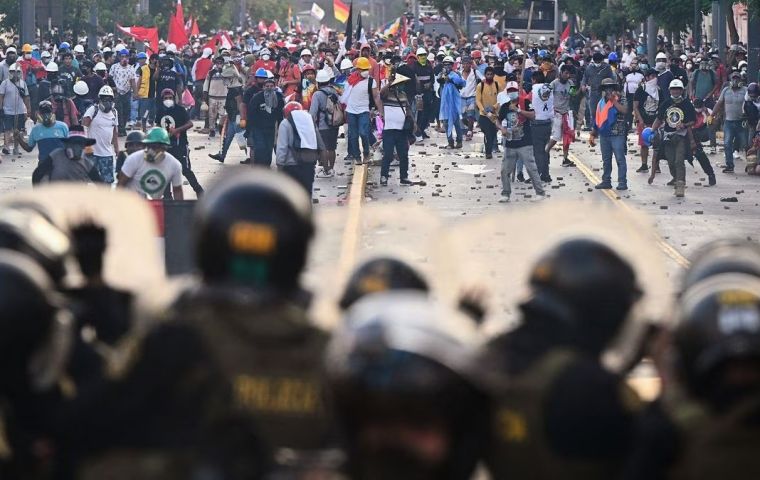MercoPress. South Atlantic News Agency
IACHR speaks of extrajudicial executions and a massacre in Peru
 President Dina Boluarte insisted on denying any responsibility for the deaths of the demonstrators
President Dina Boluarte insisted on denying any responsibility for the deaths of the demonstrators The Inter-American Commission on Human Rights (IACHR) filed a report this week mentioning extrajudicial executions in Peru and using the word “massacre” in reference to police repression against demonstrators following the impeachment of then-President Pedro Castillo Terrones on Dec. 7.
The agency demands that those responsible be punished and suggests that the investigations should have “an ethnic-racial focus” since most victims were indigenous people and peasants from the Andean areas. ”The State's response (to the protests) was characterized by the disproportionate, indiscriminate, and lethal use of force,“ the report notes.
The IACHR denounces the firing of shots by the security forces against demonstrators and against people who were not participating in the demonstrations, even against health brigade members who were attending to the wounded, which ”could constitute extrajudicial executions.“
This report also specifies that the protests and repression have taken place ”in a marked context of historical discrimination based on ethno-racial origin and socio-economic situation,“ fundamentally against the indigenous population, and in a framework of ”strong tension“ between Lima and other regions, especially those of the southern Andean region.
The document denounces a stigmatization campaign by accusing those mobilized against the government of being ”terrorists“ and ”violent“. Stigmatization extended to those who denounce human rights violations.
Since the protests broke out after the dismissal and imprisonment of Castillo, 49 people have been killed by police and army shootings. The total number of deaths in the protests is 67. There are more than a thousand wounded and numerous arbitrary detentions.
The IACHR report focuses on the Dec. 15 killing of 10 people in Ayacucho and on Jan. 9 of 18 demonstrators in Juliaca. The IACHR admits there were acts of violence by some demonstrators who tried to take over the airports of both localities, but denounces that shots were fired at unarmed residents far from the airports, so it was an action ”of a persecutory nature.“
The report also suggests shots were fired to kill, targeting ”vital organs“. The victims were shot in the head, thorax, abdomen, or back, as confirmed by autopsies. ”These acts, when perpetrated by State agents, could constitute extrajudicial executions,“ the IACHR denounces. The IACHR adds that these ”multiple deprivations of the right to life“ could qualify ”as a massacre.“
Testimonies of relatives of victims who have been injured by the repression are reviewed, denouncing that they are discriminated against in health centers for having participated in the protests and for being indigenous.
”The Commission strongly condemns the indiscriminate use of force through firearms against the unarmed population by agents of the Peruvian State,“ reads the IACHR report. Among its recommendations, it demands comprehensive reparations for the victims and their families, including access to justice and the right to truth, attention to their physical and mental health, and monetary reparations. The organization demands a ”prompt, serious, effective, independent“ investigation by specialized human rights prosecutors, trials with independent judges, and punishment for the guilty.
President Dina Boluarte replied that her government respects human rights and promotes dialogue and social peace and insisted on denying any responsibility for the deaths due to repression and again blamed the deaths on the demonstrators.
”We reject the alleged existence of extrajudicial executions and the qualification of 'massacre',” she said.
Meanwhile, Amnesty International (AI) has called on Canada to stop exporting firearms to Peru in light of the Peruvian authorities' “violent repression” of protests. A report by the organization concluded that the Peruvian armed forces and police have used “illegitimate and sometimes indiscriminate lethal force and less lethal means against demonstrators, especially against indigenous people and peasants and farmers.”
“Unless it immediately suspends arms exports to Peru, Canada risks facilitating further deadly and racist attacks on protesters and their rights to freedom of expression and assembly,” AI's executive director in Peru, Marina Navarro, said in a statement.
“Continuing to sell arms to Peru raises concerns about Canada's compliance with its domestic and international human rights obligations,” she added.




Top Comments
Disclaimer & comment rulesCommenting for this story is now closed.
If you have a Facebook account, become a fan and comment on our Facebook Page!